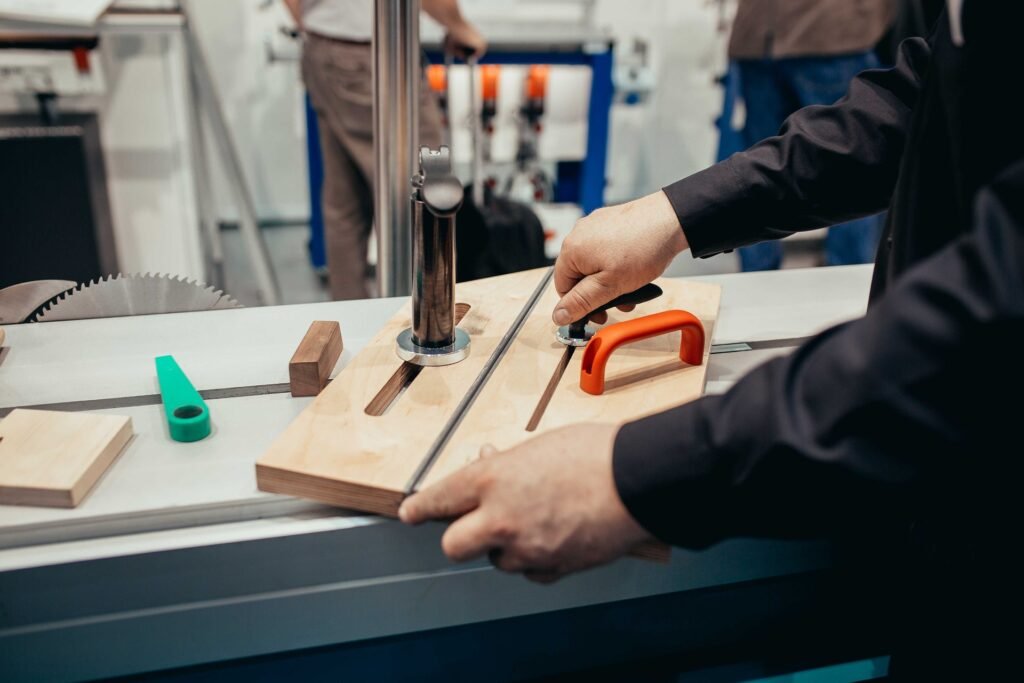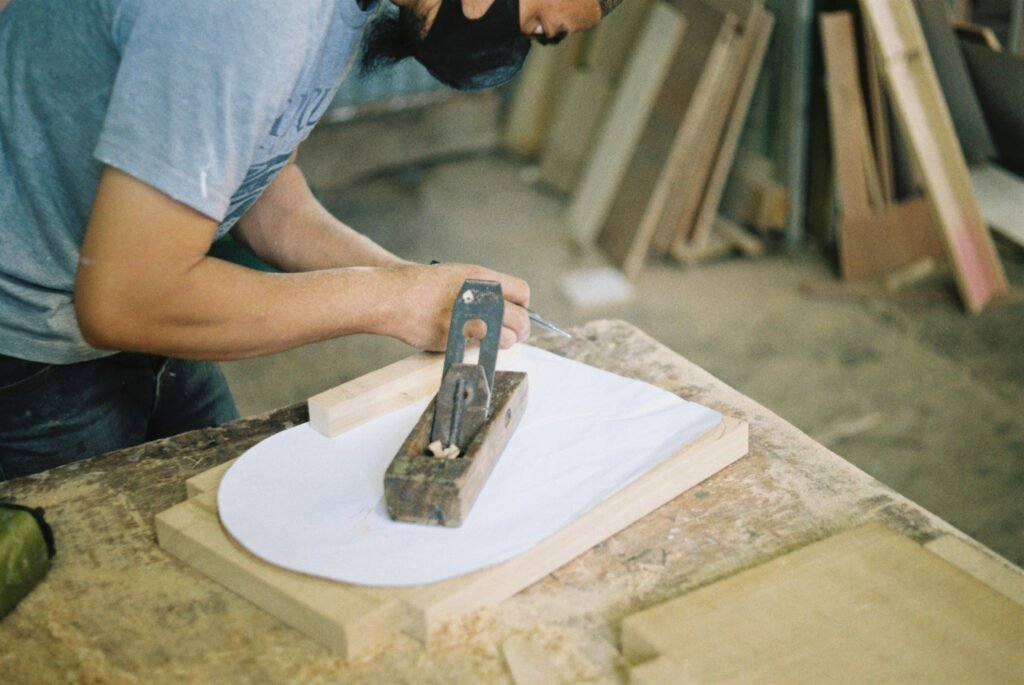Woodworking is an age-old craft that allows individuals to harness their creativity and transform raw materials into functional or decorative pieces. The significance of woodworking extends beyond mere construction; it encompasses a rich tradition of artistry, skill, and the joy of creating something tangible. For beginners, entering the world of woodworking can be an immensely rewarding experience, offering opportunities to learn valuable skills while engaging in a fulfilling hobby.
At its core, woodworking is about manipulating wood to produce items that serve practical purposes or reflect an individual’s personal style. Whether it’s crafting furniture, designing intricate decor, or building practical storage solutions, the projects one can undertake are limitless. This versatility makes woodworking accessible to everyone, regardless of prior experience. As beginners embark on their woodworking journey, they will not only acquire technical skills but also gain a profound appreciation for the beauty of the material.
The act of working with wood can be meditative, allowing individuals to focus their minds and channel their energy into each project. The satisfaction derived from seeing a completed piece, especially one crafted with personal effort and creativity, is unparalleled. This sense of achievement fosters confidence in the woodworker and encourages further exploration of more complex projects. Moreover, woodworking provides an excellent opportunity for hands-on learning, problem-solving, and critical thinking—all essential skills that can be applied beyond the workshop.
Furthermore, the woodworking community is vibrant and supportive, filled with resources such as tutorials, forums, and local workshops. Beginners are encouraged to seek guidance and share experiences with others, enhancing their skills in a collaborative environment. This camaraderie not only enriches the learning experience but also motivates individuals to push the boundaries of their creativity and craftsmanship.
Essential Tools for Beginner Woodworkers
Embarking on a woodworking journey requires a solid foundation of tools that facilitate creativity and precision. For beginners, investing in essential tools can significantly enhance the woodworking experience while promoting skill development. Below is a list of fundamental tools that every novice woodworker should consider acquiring.
Firstly, a quality hand saw is indispensable. This tool enables beginners to make clean, straight cuts. When selecting a hand saw, look for one that feels comfortable and well-balanced in your hand. A panel saw or a coping saw can serve various cutting needs, making them versatile additions to your toolkit.
Next, a combination square is crucial for measuring and marking right angles. This tool allows woodworkers to ensure precision in their cuts and joinery, an essential aspect of any project. Opt for a sturdy, rust-resistant model to guarantee longevity and reliability.
An orbital sander should also be considered. This tool simplifies the sanding process, producing smooth surfaces more quickly than manual sanding. Beginner woodworkers can look for models with adjustable speeds to cater to different types of wood and finishes.
Another necessary tool is a set of clamps. Clamps secure material together during glue-ups or when cutting multiple pieces, ensuring accuracy and consistency. Quick-release or bar clamps are popular among beginners due to their ease of use.
Finally, a drill/driver is vital for creating holes for screws or dowels and can also assist in driving screws into wood. A cordless model enhances portability and convenience. Selecting a tool with variable speed settings will allow for greater control in various applications.
By acquiring these essential tools, beginner woodworkers can establish a functional and efficient workshop, empowering them to take on various projects without overspending on unnecessary items.
Selecting the Right Wood for Your Projects
Choosing the appropriate type of wood for your woodworking projects is a crucial step for beginners. Woods are generally categorized into two main types: softwoods and hardwoods. Softwoods, such as pine, cedar, and fir, tend to be less dense and are easier to work with, making them ideal for novice woodworkers. These types of wood are typically more affordable and widely available, allowing beginners to experiment without a substantial investment. Softwoods also accept paint and stain well, providing flexibility in finishing options.
On the other hand, hardwoods, including oak, maple, and walnut, are denser, tougher, and often require more advanced techniques for cutting and shaping. Hardwoods are generally more expensive and can be more challenging to source, yet they yield durable and aesthetically pleasing results. As such, it’s essential for beginners to assess their project’s requirements and select wood that balances craftsmanship with accessibility. For instance, if the project demands a high-quality finish or structural integrity, opting for a hardwood may be worthwhile despite the increased cost.
Understanding wood grain is also fundamental when selecting wood. The grain pattern can influence both the visual appeal and the functional attributes of the finished piece. A tight, straight grain is often preferred for finer furniture, while a more pronounced grain pattern might be suitable for rustic designs. Furthermore, considering the wood’s finish is vital; different types of wood react uniquely to stains and sealants, potentially impacting the final look and feel of the project. By carefully evaluating the characteristics of softwoods and hardwoods, as well as the wood grain and finish, beginners can ensure a successful woodworking experience tailored to their needs.
Simple Furniture Projects to Get Started
Woodworking offers a gratifying opportunity for beginners to develop their skills through various simple furniture projects. Engaging in these projects not only allows novices to experiment with different techniques but also yields functional items that can enhance their living spaces. Below are several beginner-friendly woodworking projects, including a small bookshelf, a stool, and a coffee table, with relevant details to facilitate the crafting process.
First, a small bookshelf is an ideal project for newcomers looking to build something practical. For this endeavor, you will need materials such as plywood or pine boards, wood glue, screws, and a finish of your choice. The project generally requires about four to six hours to complete, depending on the complexity of your design. Basic woodworking tools like a saw, drill, and sander will be essential to this task, making it a manageable endeavor for those just starting out.
Another straightforward project is constructing a simple stool. This project allows individuals to practice precise cuts and assembly techniques. Materials can include hardwood for durability, screws, and a stain or paint for finishing. The overall completion time usually ranges from two to four hours, making it a fairly quick project. Assembling the various parts—seat, legs, and support—is an excellent way to familiarize yourself with fundamental woodworking principles.
Lastly, consider building a coffee table, which serves as both a functional piece and a decorative element in living rooms. The materials required for this project often include solid wood for a strong structure, joinery materials, and a finish. Expect this project to take around six to eight hours, emphasizing more advanced skills like creating joints and surface finishing. With attention to detail, a coffee table can be a gratifying project that showcases your capabilities.
Through these simple furniture woodworking projects, beginners can gain confidence while developing essential skills, paving the way for more advanced challenges in the future.
Fun Decorative Projects to Explore
Woodworking can be an immensely rewarding hobby, particularly when engaging in decorative projects that allow beginners to hone their skills while producing beautiful, functional pieces. Among the various options available, creating picture frames, wooden coasters, and wall art stand out for their appeal and relative simplicity.
Picture frames are an excellent starting point for novice woodworkers. They allow for creativity in design and can be customized to suit personal tastes or décor styles. By learning to accurately measure, cut, and join wood panels, beginners can enhance their craftsmanship while producing a charming frame for treasured photographs or artwork. Available in various styles—from rustic to modern—these frames not only serve a practical purpose but also add a personalized touch to any space.
Another interesting project is crafting wooden coasters. These small yet functional items can be tailored using an array of wood types and finishes. Coasters offer numerous possibilities for experimentation, including different shapes, sizes, and decorative techniques such as woodburning or painting. Additionally, they provide a practical way to practice sanding and finishing techniques, which are essential skills for any woodworking endeavor. Coasters are perfect introductory projects as they require minimal material and time commitment, making them accessible for beginners eager to showcase their handiwork.
Lastly, wall art presents an opportunity for creativity and expression. Woodworking enthusiasts can explore various dimensions and designs, ranging from geometric patterns to nature-inspired motifs. By combining cutting techniques with color choices and textures, beginners can create stunning pieces that enhance home interiors. Engaging in these projects helps build a strong foundation in woodworking while encouraging artistic exploration.
Overall, decorative woodwork projects like picture frames, coasters, and wall art provide an enriching starting point for beginners. These projects not only help develop fundamental skills but also foster a sense of achievement as sculpted creations come to life.
Safety Tips for Beginner Woodworkers
Woodworking can be an enjoyable and rewarding hobby, but safety should always be a top priority, especially for beginners. Understanding and implementing safety measures is crucial to prevent accidents and injuries while working with tools and materials. One of the most fundamental aspects of safety in woodworking is the use of appropriate protective gear. This includes safety goggles to protect the eyes from flying debris, dust masks to avoid inhaling harmful particles, and gloves to shield the hands from cuts and abrasions. Additionally, hearing protection should be used when operating loud machinery, as prolonged exposure can lead to hearing loss.
Tool handling is another critical aspect that must be observed carefully. It is essential for beginner woodworkers to familiarize themselves with each tool’s operation and safety features before use. Read the manufacturer’s instructions and receive proper training if necessary. Using the right tool for the job can significantly reduce the occurrence of accidents. When cutting, always use pushsticks or other devices to keep fingers a safe distance from the blade and never reach across a cutting line while the saw is operating.
Moreover, maintaining an organized and clean workspace can greatly enhance safety. Cluttered areas can lead to trip hazards or the displacement of tools, which can cause accidents. Ensure that all tools are stored properly when not in use and that the work area is free from unnecessary items. Proper lighting is equally important; a well-lit workspace enables better visibility and reduces the risk of errors that may lead to injuries.
Lastly, an aspect often overlooked is the importance of being vigilant and focused while working. Distractions can lead to mistakes, so it is advisable to work in a tranquil environment where concentration can be maintained. By adhering to these safety guidelines, beginner woodworkers can create a secure environment that fosters creativity and confidence in their projects.
How to Improve Your Woodworking Skills
Improving your woodworking skills is a gradual process that benefits from consistent practice and a willingness to learn. As a beginner, it’s imperative to explore various approaches that can enhance your abilities and deepen your understanding of the craft. One effective method is to engage in practice projects that align with your skill level. Simple items like birdhouses, picture frames, or small shelves can serve as excellent starting points. These projects not only provide hands-on experience but also instill a sense of accomplishment as you complete each piece.
Online courses have become an invaluable resource for aspiring woodworkers. Platforms such as Skillshare, Udemy, and YouTube offer a plethora of tutorials ranging from basic techniques to advanced projects. These courses allow you to learn at your own pace and revisit complex concepts as necessary. Moreover, many of these resources feature community forums where you can ask questions and share your progress, promoting an interactive learning experience.
In addition to online resources, consider participating in local workshops. Many community centers and specialty woodworking shops host classes that cater to beginners. These hands-on opportunities enable you to receive immediate feedback from experienced instructors, which is crucial for mastering essential woodworking skills. Furthermore, working alongside fellow enthusiasts can foster valuable connections and provide motivation as you embark on your woodworking journey.
Joining local or online woodworking communities is another great way to enhance your skills. These groups offer support, share tips, and often host challenges that push their members to try new techniques. The sharing of knowledge within these communities can be incredibly beneficial, as members showcase their projects and provide constructive criticism. This collaborative environment helps to inspire continuous growth and development in woodworking.
Resources for Woodworking Education
For beginners looking to embark on their woodworking journey, having access to quality educational resources can significantly bolster their skills. A variety of materials are available to assist newbies in mastering the fundamentals and developing their craft. Below, we compile a selection of recommended books, websites, and YouTube channels dedicated to woodworking education.
One noteworthy resource is the book “The Complete Manual of Woodworking” by Albert Jackson, David Day, and Simon Jennings. This comprehensive guide provides an in-depth understanding of not only tools and techniques but also projects suitable for beginners. It serves as both a practical manual and a source of inspiration, making it an essential read.
Online platforms like Woodworking for Mere Mortals offer excellent tutorials for novices. This website features a plethora of beginner-friendly projects complete with step-by-step instructions and materials lists, making it easy for one to follow along and develop essential skills. Furthermore, their blog section frequently updates new ideas and solutions to common woodworking challenges.
For visual learners, YouTube is an invaluable resource. Channels such as The Wood Whisperer and DIY Creators provide a rich library of tutorial videos that cover a wide range of topics from basic joinery to advanced techniques. These channels present woodworking concepts in an engaging manner, ideal for those who prefer watching rather than reading.
Lastly, forums like Reddit’s r/woodworking community present a supportive space where beginners can ask questions, share projects, and obtain feedback. Engaging with experienced woodworkers can provide insight that is often more challenging to find in books or videos.
Together, these resources can significantly enhance a beginner’s woodworking education, offering myriad opportunities to learn, practice, and refine their craft.
Conclusion: Your Woodworking Journey Begins
Embarking on a woodworking journey can be an exhilarating experience filled with opportunities for creativity and personal growth. For beginners, the prospect of transforming raw timber into functional and aesthetically pleasing creations may seem daunting, yet it is a pursuit that rewards persistence and enthusiasm. Each project, no matter how simple or complex, offers a unique opportunity to develop skills and gain confidence in your abilities.
Selecting your first woodworking project is a crucial step in your journey. It may be beneficial to choose an undertaking that matches your current skill level while still challenging you to learn new techniques. Whether it’s crafting a small bookshelf or a set of coasters, starting with a manageable project allows for a sense of accomplishment, which is vital for maintaining motivation. Remember that mistakes are part of learning, and each misstep serves as a valuable lesson that contributes to your overall development as a woodworker.
Moreover, the woodworking community is a supportive and resourceful environment for newcomers. Engaging with fellow enthusiasts through workshops, online forums, or local clubs can provide a wealth of knowledge and encouragement. Sharing experiences, ideas, and solutions can foster connections that enhance your skills and enrich your woodworking journey. Working alongside others can amplify the satisfaction derived from crafting with wood, creating a sense of camaraderie that is difficult to replicate in solitary endeavors.
As you stand on the threshold of your woodworking adventure, embrace both the challenges and the rewards that lie ahead. With time, practice, and dedication, you will not only hone your crafting skills but also cultivate a passion for woodworking that could become a lifelong pursuit. Start today, and let the beauty of your creative expression unfold through the craftsmanship of woodwork.



